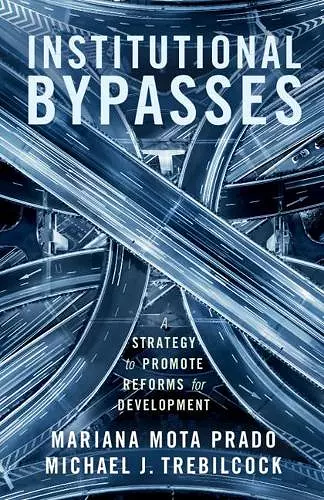Institutional Bypasses
A Strategy to Promote Reforms for Development
Michael J Trebilcock author Mariana Mota Prado author
Format:Hardback
Publisher:Cambridge University Press
Published:22nd Nov '18
Currently unavailable, and unfortunately no date known when it will be back

Analyzes institutional bypasses, a strategy to promote change and implement reforms in developing countries.
Institutional bypasses are a strategy to implement reforms in developing countries. Supported by careful research, this book will appeal to development scholars interested in understanding institutional change. Using accessible language and case studies, it is also attractive to students, government officials and national and international leaders.Institutional bypass is a reform strategy that creates alternative institutional regimes to give citizens a choice of service provider and create a form of competition between the dominant institution and the institutional bypass. While novel in the academic literature, the concept captures practices already being used in developing countries. In this illuminating book, Mariana Mota Prado and Michael J. Trebilcock explore the strengths and limits of this strategy with detailed case studies, showing how citizen preferences provide a benchmark against which future reform initiatives can be evaluated, and in this way change the dynamics of the reform process. While not a 'silver bullet' to the challenge of institutional reform, institutional bypasses add to the portfolio of strategies to promote development. This work should be read by development researchers, scholars, policymakers, and anyone else seeking options on how to promote change and implement reforms in developing countries around the world.
'Institutions matter for development, but many just don't work. This agenda-setting book labels and analyses the solution some reformers are already using: the 'institutional bypass', which works like heart surgery to create an alternative route around blockages. Prado and Trebilcock use a well-chosen set of bypass experiments, mostly from Brazil, to identify both the potential and the drawbacks of this tool. A crucial read for anyone interested in institutions that really work.' Kathryn Hochstetler, London School of Economics and Political Science
'The literature on economic development is long on the importance of institutional reform, but short on practical approaches to getting it done. This is the rare book that offers an operational strategy - called 'institutional bypasses' - that is generic, yet readily customizable to local circumstances. Through their conceptual framework and case studies, the authors provide a fascinating new perspective on the design and consequences of piecemeal, gradual reform.' Dani Rodrick, Harvard Kennedy School, author of One Economics, Many Recipes: Globalization, Institutions, and Economic Growth
'This innovative work addresses the problem of overcoming political and cultural resistance to reform of inefficient institutions. Mariana Mota Prado and Michael J. Trebilcock show how and why institutional bypasses, which are not based on a one-size-fits-all imported blueprint, are more likely to succeed. This book should be required reading for both policymakers and students of development policy.' Frank H, Stephen, University of Manchester, author of Law and Development: An Institutional Critique
'… reading this book is highly recommended, not because policymakers should be asked to develop a large number of institutional bypasses, but because this concept can guide the discussion of the most relevant issues in the contemporary debate on law and development: how dysfunctional institutions are identified, who are the winners and losers with each type of institutional bypass, what kind of institutional complementarities can be fostered, how the impact of bypasses can be evaluated, and how to compare bypasses in different legal systems.' Giuseppe Bellantuono, Verfassung und Recht in Übersee
ISBN: 9781108473811
Dimensions: 236mm x 158mm x 13mm
Weight: 390g
160 pages